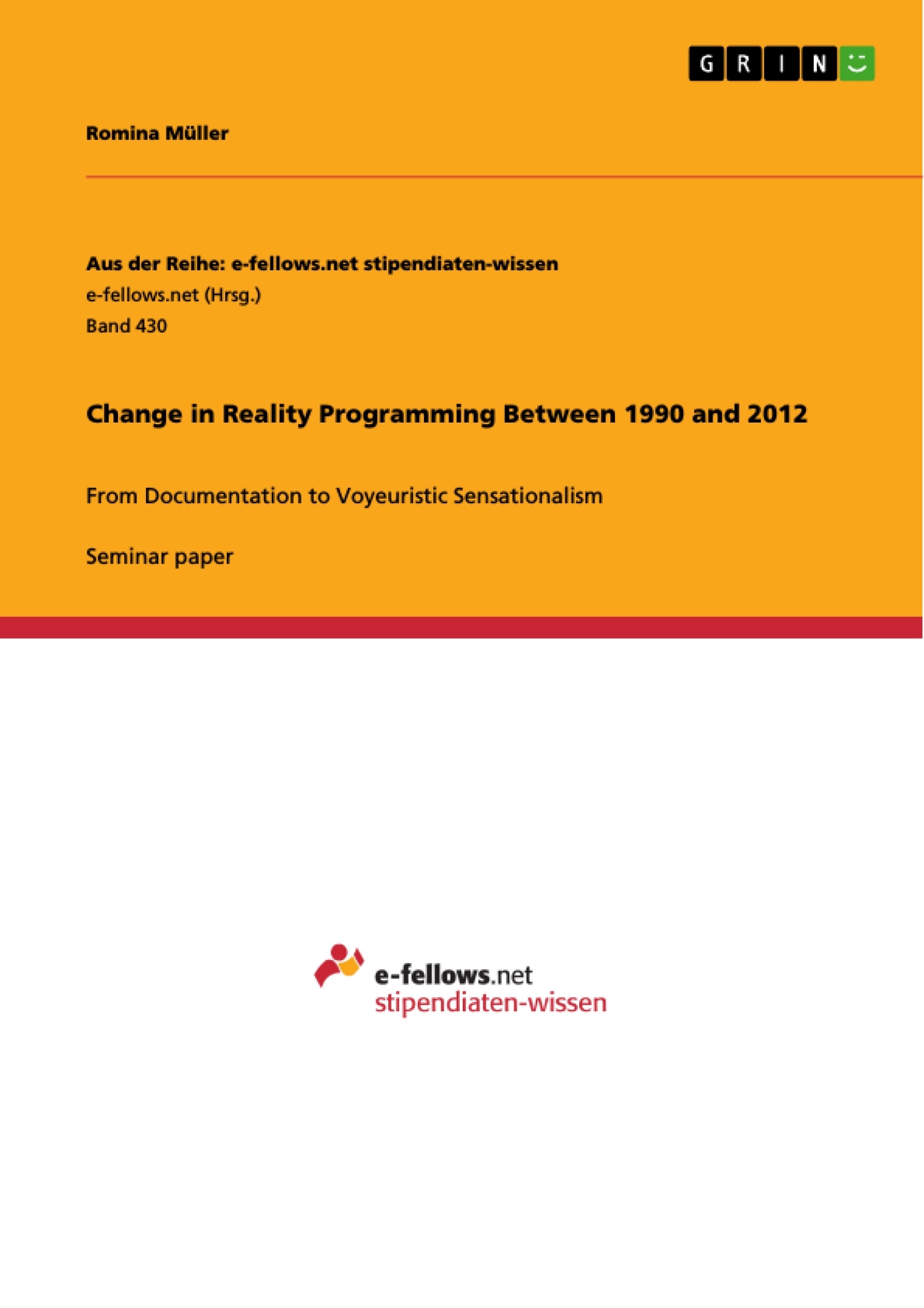They have become a prominent part of today’s television culture: reality TV shows. Since the 1990s, these shows have taken over the media landscape and turned into a fascination. Driven by humans’ voyeuristic personalities, television producers saw the money-making possibilities in this cheap and easy-to-produce genre. But over the last two centuries, reality television has tremendously changed and pushed its limits to the extreme. This paper will analyze the changes of the genre between 1990 and 2012 and look at popular shows during these years.
Inhaltsverzeichnis (Table of Contents)
- Change in Reality Programming Between 1990 and 2012
- From Documentation to Voyeuristic Sensationalism
- The Birth of Reality Television
- The Rise of Reality TV
- The Shift in Reality Programming
- Celebrity-Starring Shows
- Dating Shows
- Lifestyle Change and Makeover Shows
- The Outrageous and Sensational
- Voyeuristic Sensationalism: The Case of Intervention
- MTV's Jersey Shore
- The Question: Did Reality TV Go Too Far?
- Conclusion
Zielsetzung und Themenschwerpunkte (Objectives and Key Themes)
This paper aims to analyze the changes in reality programming between 1990 and 2012. It explores the evolution of the genre from its early documentary-style beginnings to its current focus on sensationalism and voyeurism. The paper examines popular shows of each era, highlighting the key trends and transformations that shaped reality television. * **The Rise of Reality Television**: The paper traces the origins and growth of reality television, focusing on the early days of shows like The Real World and its contribution to mainstream culture. * **The Shift towards Celebrity-Driven Content**: The paper examines the transition from shows featuring ordinary people to those showcasing celebrities and their lives. * **The Growing Influence of Voyeurism**: The paper analyzes the increasing focus on sensational and often controversial content, exploring the role of producers in creating and exploiting these narratives. * **The Ethical Considerations of Reality Programming**: The paper discusses the ethical implications of the genre, particularly regarding its portrayal of individuals and the potential for exploitation. * **The Changing Nature of Reality**: The paper explores how reality television has become increasingly staged and scripted, questioning the authenticity of the genre and its impact on viewer perceptions.Zusammenfassung der Kapitel (Chapter Summaries)
- Change in Reality Programming Between 1990 and 2012: From Documentation to Voyeuristic Sensationalism: This chapter introduces the topic of reality programming and its significant evolution over the past two decades. The paper highlights the shift from documentary-style shows that aimed to portray real life to those that prioritize sensationalism and voyeurism.
- The Birth of Reality Television: This chapter explores the origins of reality television, tracing its roots back to shows like Candid Camera. It focuses on the early 1990s and the emergence of shows like The Real World, which played a significant role in popularizing the genre.
- The Rise of Reality TV: This chapter examines the rise of reality television in the late 1990s and early 2000s. It discusses the increasing popularity of the genre, the various subgenres that emerged, and the impact of shows like The Real World on shaping the genre's identity.
- The Shift in Reality Programming: This chapter delves into the significant shift that occurred in reality programming during the early 2000s. It explores the emergence of celebrity-driven shows, dating shows, and makeover shows, and the reasons behind these changes.
- The Outrageous and Sensational: This chapter analyzes the growing trend towards sensational and outrageous content in reality programming. It highlights the shift from portraying ordinary lives to showcasing more dramatic and controversial narratives.
- Voyeuristic Sensationalism: The Case of Intervention: This chapter examines the show Intervention, which exemplifies the trend of exploiting individuals' struggles for entertainment purposes. It raises ethical concerns about the producers' responsibility and the potential exploitation of vulnerable individuals.
- MTV's Jersey Shore: This chapter discusses the popularity of MTV's Jersey Shore, a show that exemplifies the extreme shift towards sensationalism. It analyzes the controversies surrounding the show and its impact on viewer perceptions of reality programming.
Schlüsselwörter (Keywords)
This paper examines the evolution of reality programming, focusing on the shift from documenting everyday life to creating sensationalized narratives. Key themes include the rise of reality television, the influence of celebrities, the growing emphasis on voyeurism, the ethical considerations of exploitation, and the blurring lines between reality and entertainment.Frequently Asked Questions
How did reality TV evolve between 1990 and 2012?
Reality TV shifted from documentary-style portrayals of everyday life to sensationalized, voyeuristic content focused on celebrities and controversy.
What role did MTV's "The Real World" play in the genre?
"The Real World" was a pioneer in the 1990s that popularized the genre and set the stage for the rise of mainstream reality television.
What are the ethical concerns regarding reality shows like "Intervention"?
Critics raise concerns about the exploitation of vulnerable individuals' struggles for entertainment and the responsibility of producers in these narratives.
Why did reality programming shift towards celebrity-driven content?
Producers recognized the financial potential of human voyeurism and used celebrities to attract larger audiences with dramatic and sensationalized lives.
Is modern reality TV authentic or staged?
The genre has become increasingly scripted and staged over time, leading to questions about its authenticity and impact on viewer perceptions of reality.
- Arbeit zitieren
- Romina Müller (Autor:in), 2012, Change in Reality Programming Between 1990 and 2012, München, GRIN Verlag, https://www.grin.com/document/194062



